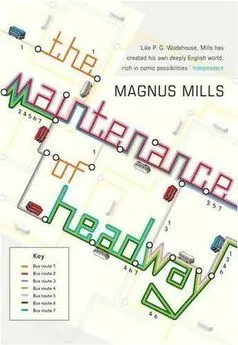Magnus Mills - The Maintenance of Headway
- Название:The Maintenance of Headway
- Автор:
- Жанр:
- Издательство:Bloomsbury UK
- Год:2009
- ISBN:нет данных
- Рейтинг:
- Избранное:Добавить в избранное
-
Отзывы:
-
Ваша оценка:
Magnus Mills - The Maintenance of Headway краткое содержание
It's a matter of procedure,' I explained. 'Strictly for the record. You don't get sacked from this job unless you did what Thompson did.' 'What did he do then?' 'We never mention it.' In Magnus Mills' brilliant short novel he transports us into the bizarre world of the bus drivers who take us to work, to the supermarket, to the match and home again. It is a strange but all too real universe in which 'the timetable' and 'maintenance of headway' are sacred, but where the routes can change with the click of an inspector's fingers and the helpless passengers are secondary. The journey from the southern outpost to the arch, the circus and the cross will seem as familiar as your regular route, but then Magnus Mills shows you the almost religious fervour which lies behind it, and how it is fine to be a little bit late but utterly unforgivable to be a moment early. 'To write one unique book is a rare achievement. The ability to produce several is truly special.' Independent
The Maintenance of Headway - читать онлайн бесплатно полную версию (весь текст целиком)
Интервал:
Закладка:
Slumped on one of the low chairs was a driver, fast asleep. I happened to know he was a recent recruit, and clearly he was not yet accustomed to the regime. Hastings marched over to him and there followed an unfortunate scene in which the poor fellow was woken unceremoniously from his slumbers. Then, still in a dazed state, he was ordered downstairs to take over the stranded bus. I was glad it wasn’t me.
Davy and I finished off our business with the dockets. I checked my watch. Fifteen minutes remaining. Just time for another tea.
“Look,” said Davy. “There goes Mick.”
I glanced across the canteen. Mick Wilson had just come in and was heading towards the officials’ annexe, accompanied by two inspectors. They were both in full uniform and walked one on each side of him. We gave Mick a wave, and he nodded in reply. Then he was gone.
“I wonder how long it’ll be before he undergoes his conversion?” I said.
“Same as the others, I expect,” said Davy. “Virtually instantaneous.”
“I’d have thought Mick would hold out for at least a short while,” I said. “After all, he’s an archetypal early man.”
“That doesn’t seem to make any difference,” replied Davy. “Look at the way Barrington was transformed in a matter of only a few days.”
“Oh, yes, Barrington,” I said. “I’d forgotten all about him.”
“Exactly,” said Davy. “He used to be very much one of us, yet he accepted the entire doctrine in a twinkling. No questions asked. Needless to say it did him no good at all. Two years, he lasted, before vanishing into obscurity.”
“Friendless and forgotten.”
“Indeed.”
“I hope that doesn’t happen to Mick,” I said.
“Well, it might,” Davy answered.
Two
“There’s no excuse for being early,” said Breslin.
“No, I suppose not.”
“None whatsoever.”
“No.”
“It is forbidden.”
“Yes.”
This was the second time in a week Breslin had pulled me up for being early, and he would have been well within his rights to throw the book at me. He was quite correct, of course. There was no excuse for being early. Today, however, there was at least a reason. During the morning a water main had burst on the approach road south of the river, and the ensuing emergency repairs had blocked the route to the common. A diversion was put in operation which sent all our buses along the embankment. It so happened the repair work had been completed just as I came over the bridge. The diversion was therefore lifted and I continued along the normal route. Now generally on these occasions the first bus to arrive after a long interval gets clobbered with people, and there were indeed a lot of them waiting at the stops. By some fortune, though, the ones who came onto my bus were what I called a ‘good sample’. This was my term for people who didn’t dawdle when they came on board. They knew where they were going, they had the correct fares ready beforehand, and they didn’t waste time bewailing the lack of buses. They were on their way to work, mostly, all heading for the same destination, namely the underground station at the far side of the common, and it was in none of their interests to delay the bus. Once I’d served the first few stops I was packed to the gunwales, so I put my foot down and pressed on, my priority being to get these people on their way as quickly as possible. It wasn’t until I neared the edge of the common and saw Breslin standing there that I bothered to check the time. I was six minutes early. He flagged me down and I stopped.
“You’re six minutes early,” he announced.
“Yes,” I replied. “But I’ve got about ninety people here.”
Breslin peered inside.
“So you have,” he said, before uttering his oft-repeated mantra. “There’s no excuse for being early.”
Nevertheless, I sensed today it wasn’t actually the six minutes that concerned him, but rather the fact all his buses were coming along in the wrong order. This was a state of affairs he simply could not embrace. Some buses that should have been in front of me were now trailing well behind, and he was going to have his work cut out for the rest of the morning getting them all rearranged. And because I was early he had the perfect pretext to detain me.
“You’ll have to stay here for a minute or two.”
It didn’t matter to Breslin that there were ninety people desperate to reach their journeys’ end. It was the running order of the buses themselves that interested him. He stood in the doorway examining his watch with an air of detached authority. As always he was wearing his uniform black tunic, black trousers, black shoes and black peaked cap. The people remained silent. After a minute another bus, also fully-loaded, arrived and departed again. A further minute went slowly by, and finally Breslin let me go.
“Slow down a little, will you?” was his parting remark.
I watched him dwindle in my mirror, suddenly realising that once again he’d let me off without a booking.
Back at the garage I discussed the incident with Edward and Jeff.
“You’d think they’d be grateful, wouldn’t you?” said Jeff with indignation. “Any other business would be highly delighted if you delivered the goods six minutes ahead of schedule.”
“Unfortunately this isn’t a business,” said Edward. “It’s a service.”
We all laughed. He might have added that it was people we were conveying, not goods.
“What Breslin attempted this morning was a form of alchemy,” he continued. “If he’d left the buses to sort themselves out they’d most probably have been back in the desired sequence after a couple of hours. Instead he tried to dispel chaos at a stroke, and as usual nobody gained. The fact is it’s almost impossible to run a proper bus service in this city. The forces ranged against success are just too numerous. Oh, I know there are cities on the continent where buses are a byword for efficiency, and people wonder why it can’t happen here. But those places are bland and featureless. Mostly they’ve been bombed flat and rebuilt from scratch; the roads are spacious and the populations obedient, rational and unselfish. Buses sweep along keeping exactly to schedule, punctual at every point from start to finish. In this city it’s different. The streets are higgledy-piggledy and narrow; there are countless squares and circuses, zebra crossings and pelicans. Go east from the arch and you’ve got twenty-three sets of traffic lights in a row. All those shops, and all those pedestrians pouring into the road. Then there are the daily incidentals: street markets, burst water mains, leaking gas pipes, diesel spillages, resurfacing works, ad hoc refuse collections, broken-down vehicles, troops on horseback, guards being changed, protest marches, royal cavalcades and presidential motorcades. Shall I go on?”
“You might as well,” I said. “Now you’ve started.”
“The men who dig up the roads don’t care about the people on the buses; nor do the cabbies, the dairymen, the deliverymen, the road-sweepers, the wheel-clampers, the rickshaw-pedallers, the out-of-town coach drivers, the sightseeing operators and the host of others who conspire to clog up the bus routes. Consequently, a journey that can be completed in an hour on Tuesday may take an hour and a quarter on Wednesday and an hour and a half on Thursday. This puts the Board of Transport in a very difficult position: on the one hand they’re obliged to provide sufficient running time to allow for all these contingencies; but then on the days when nothing happens and the roads are clear, they end up stuck with a succession of early buses. Faced with this dilemma they’ve adopted a single, guiding principle from which they will not stray whatever the circumstances.”
Edward paused. I’d heard him deliver large parts of this speech before, but it was always interesting to hear his latest variation on a theme. The bit about the presidential motorcades, for instance, was a recent addition: normally he referred only to prime-ministerial motorcades.
Jeff, who was sitting opposite Edward, appeared suitably impressed. He’d only been with us a few months and it was obvious he hadn’t heard Edward in full flow before.
“What is this guiding principle?” he asked.
“The maintenance of headway,” replied Edward. “The notion that a fixed interval between buses on a regular service can be attained and adhered to.”
“But that’s preposterous!” said Jeff.
“Preposterous or not,” said Edward. “The maintenance of headway is held up as the one great truth by the Board of Transport. The officials are all indoctrinated with this central tenet. It’s what they strive towards, and it’s what makes men like Breslin believe they can perform miracles.”
Jeff looked thoughtful. “That explains something that happened last week,” he said. “What’s the name of that inspector who always tells you why?”
“Greeves,” I said.
“Oh, yes, Greeves. Well, it was early evening on Thursday. I was coming back from the cross about three-quarters full when he appeared out of nowhere and flagged me down. “Right,” he said. “I’m going to adjust you and I’ll tell you why.” Then he pointed along the ring road all flamboyantly. “Carry on as far as the underpass, but instead of turning left, get rid of your people and continue straight-ahead, out-of-service. Follow the road all the way round, and when you get to the arch start picking up again.” Next came the explanation: “I’ve got too many buses up this end and not enough down that end. You’ll be pleased to know you’re part of the remedy.” Then he signed my log card and sent me on my way.”
“Cutting out the middle section of the route,” said Edward. “That’s their most common ploy.”
“I know,” replied Jeff. “But getting rid of my people was easier said than done. They didn’t want to go, and when I arrived at the turn-off I practically had to prise them out of the bus. It was late-night closing. They didn’t want to be dumped by the underpass; they wanted to go to the circus!”
“That wasn’t part of the plan,” I remarked.
“Maybe not,” said Jeff. “All the same, I think it was an abuse of power. Greeves made me do exactly the same thing on my next trip as well. At the end of the duty there was all this mumbo-jumbo written across my log card, inscribed in his own fair hand, which was supposed to justify the disruption he’d caused.”
“The officials don’t see it as disruption,” said Edward. “Not if the purpose is the maintenance of headway.”
“But what about the people?”
“People aren’t important,” Edward declared. “Only bus movements.”
He glanced at his watch, stood up and walked away from the table, leaving Jeff and me to ponder his words.
“At least Greeves has the courtesy to explain his motives,” I said. “Some of the officials rearrange us like mere pawns on a chessboard.”
“Do you think they operate independently?” Jeff asked. “Or do they take orders from above?”
“A bit of both,” I replied. “It’s all coordinated, apparently, though you wouldn’t believe it half the time. I don’t know if you know this, but until a few years ago they had their own special telephone link. Remember those beige sentry boxes there used to be at every timing point?”
“Yeah.”
“Well, they each had a telephone inside. The inspectors used them as a sort of office, and they could all keep in touch with one another. In fact, some of them got so deeply involved in their conversations you could drive past without them noticing. Quite handy if you were a bit earlier than you intended to be. I remember once, years ago, I was in a VPB [Venerable Platform Bus] and suddenly realised I was going to get to the point ten minutes early. It was too late to do anything about it, so I pressed on and hoped for the best. Luckily, the official was on the phone with his head stuck in the box, so I put the gears in neutral and rolled quietly past without him even knowing.”
Читать дальшеИнтервал:
Закладка:





![Джеймс Купер - Пионеры, или У истоков Саскуиханны [The Pioneers, or The sources of the Susquehannah]](/books/1066142/dzhejms-kuper-pionery-ili-u-istokov-saskuihanny-t.webp)




